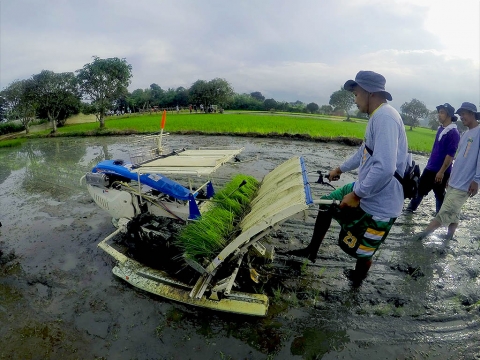A farmer in Singalat, Palayan City uses a walk-behind rice transplanter during the Training of Trainers on High Quality Inbred Rice Seed Production and Farm Mechanization. (photo by ATI Central Luzon)
DILIMAN, Quezon City—In its second year, the Rice Tariffication Law (RTL) continues to reach new milestones by capacitating and empowering more farmers and agricultural workers to compete in the international rice market.
The law, or Republic Act No. 11203, was enacted on March 5, 2019 with the aim to liberalize the importation of rice in the Philippines through the imposition of tariffs in lieu of quantitative restrictions. Ten billion pesos collected from tariff revenues go to the Rice Competitiveness Enhancement Fund (RCEF), which is being utilized for four key components, namely, farm machineries and equipment; seed development, propagation, and promotion; expanded credit assistance; and extension services.
Through these components, RCEF implementing agencies aim to achieve food security and price stability for rice, the most pivotal commodity in the country. Moreover, these initiatives are intended to improve the livelihood and competitiveness of rice farmers, while providing consumers with a locally produced variety of high-quality rice at affordable prices.
Under the Rice Extension Services Program (RESP), which is co-implemented by the Agricultural Training Institute (ATI), training activities were conducted for over 80,000 agricultural workers. More than two million copies of information, education, and communication materials were also distributed while knowledge-sharing and learning activities were held to reach a wide scope of audience.
“In the second year of RCEF implementation, we are gradually starting to feel the positive effects of RTL. We received a lot of assistance from the government, from granting of loans to the conduct of training, which further capacitated us. Today, with the help of the programs under RCEF, a lot has changed in our farming system leading to the increase of yield and to higher income. If this continues, I believe that our farmers will not be far away from real success,” said Ariel Taton, one of the RCEF beneficiaries in Iloilo City.
This year's commemoration of the RTL anniversary bears the theme “Sa Rice Tariffication Law, sama-sama tayong aasenso!”. In a statement, Department of Agriculture Secretary William Dar highlighted the accomplishments recorded in the implementation of the law, which is in effect for six years.
“As part of the observance of second anniversary of the RTL and RCEF, we commend the implementing agencies that continue to record significant milestones in carrying out their respective tasks to ensure the availability of affordable and quality rice to consumers, while increasing the productivity and incomes of rice farmers," Dar said.

